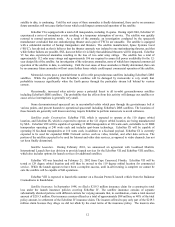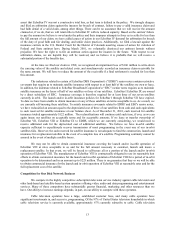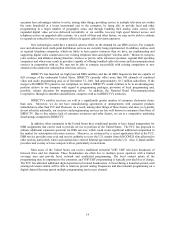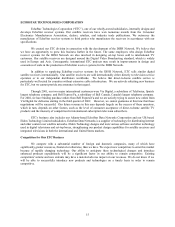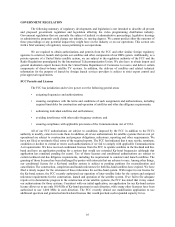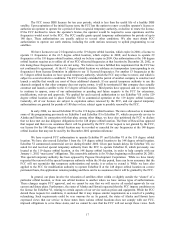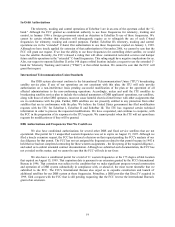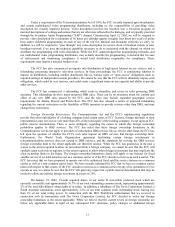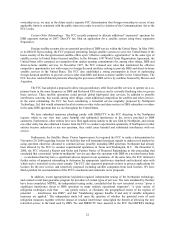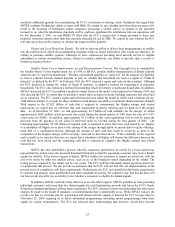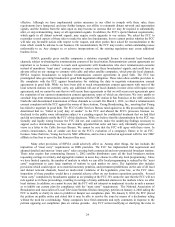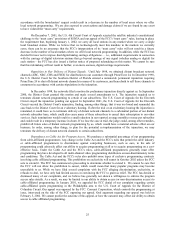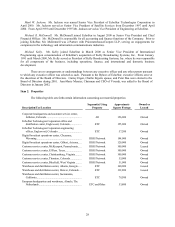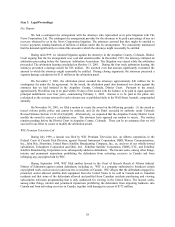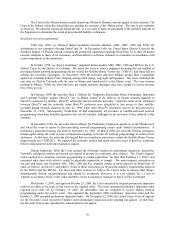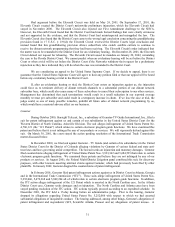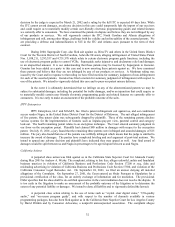Dish Network 2001 Annual Report Download - page 24
Download and view the complete annual report
Please find page 24 of the 2001 Dish Network annual report below. You can navigate through the pages in the report by either clicking on the pages listed below, or by using the keyword search tool below to find specific information within the annual report.22
ownership in us, we may in the future need a separate FCC determination that foreign ownership in excess of any
applicable limits is consistent with the public interest in order to avoid a violation of the Communications Act or the
FCC’s rules.
Certain Other Rulemakings. The FCC recently proposed to allocate additional “expansion” spectrum for
DBS operators starting in 2007. DirecTV has filed an application for a satellite system using those expansion
frequencies.
Foreign satellite systems also are potential providers of DBS service within the United States. In May 1996,
in its DISCO II proceeding, the FCC proposed permitting foreign satellite systems to serve the United States if the
home country of the foreign-licensed satellite offers open “effective competitive opportunities” in the same type of
satellite service to United States licensed satellites. In the February 1997 World Trade Organization Agreement, the
United States offer contained an exemption from market opening commitments for, among other things, DBS and
direct-to-home satellite services. In November 1997, the FCC released new rules that maintained the effective
competitive opportunities test with respect to foreign-licensed satellites seeking to provide DBS and direct-to-home
satellite services in the United States. The FCC also established a strong presumption in favor of authorizing
foreign-licensed satellites to provide services other than DBS and direct-to-home satellite in the United States. The
FCC has also reached bilateral protocols allowing the provision of DBS service by satellites licensed by Mexico and
Argentina.
The FCC has adopted a proposal to allow non-geostationary orbit fixed satellite services to operate on a co-
primary basis in the same frequency as DBS and Ku-based FSS services, and is currently finalizing rules to govern
these services. These satellite operations could provide global high-speed data services. In addition to possible
interference concerns, this would, among other things, create additional competition for satellite and other services.
In the same rulemaking, the FCC has been considering a terrestrial service originally proposed by Northpoint
Technology, Ltd. that would retransmit local television or other video and data services to DBS subscribers or others
in the same DBS spectrum that we use throughout the United States.
We have submitted numerous pleadings jointly with DIRECTV to the FCC objecting to the Northpoint
request, which in our view may cause harmful and substantial interference to the service provided to DBS
customers. Furthermore, other entities have now filed applications similar to the one filed by Northpoint, and at least
one other entity has also obtained a license from the FCC to conduct experimental operations. If Northpoint or other
entities become authorized to use our spectrum, they could cause harmful and substantial interference with our
service.
Furthermore, the Satellite Home Viewer Improvement Act required the FCC to make a determination by
November 29, 2000 regarding licenses for facilities that will retransmit broadcast signals to underserved markets by
using spectrum otherwise allocated to commercial use, possibly including DBS spectrum. Northpoint had already
been allowed by the FCC to conduct experimental operations in Texas and Washington, D.C. On December 8,
2000, the FCC released a Report and Order and Further Notice of Proposed Rulemaking in this proceeding that
concluded that a terrestrial “point-to-multipoint” service can share the spectrum with DBS on a no interference basis
— a conclusion that may have a significant adverse impact on our operations. At the same time, the FCC initiated a
further notice of proposed rulemaking to determine the appropriate interference standards and technical rules with
which such a terrestrial service must comply. The FCC also requested proposals on how to process applications for
licenses for the new service, and tentatively proposed excluding satellite companies from such licenses. We have
filed a petition for reconsideration of the FCC’s conclusion and comments on its proposals.
In addition, recent appropriations legislation required independent testing of the Northpoint technology,
and created a rural loan guarantee program for providers of certain types of services. The tests mandated by that law
have been completed. MITRE, the independent testing entity, concluded that the new terrestrial service “poses a
significant interference threat to DBS operation in many realistic operational situations”; “a wide variety of
mitigation techniques exist that . . . can greatly reduce, or eliminate, the geographical extent of the regions of
potential . . . interference into DBS”; and that “bandsharing appears feasible if and only if suitable mitigation
measures are applied.” The independent study left open the question of whether the potential costs of such
mitigation measures together with the impact of residual interference outweighed the benefit of allowing the new
terrestrial service in the band used by DBS. We and DIRECTV have asserted to the FCC that MITRE's findings


